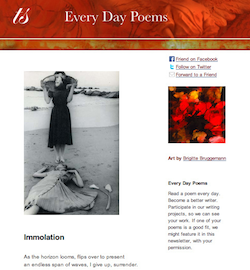With apologies to Robert Browning, Marianne Moore,
Dylan Thomas, Elizabeth Bishop, Sylvia Plath, Mother
Goose, and my readers
I, too, dislike the villanelle,
redundant song that tasks one’s reason,
its circuit subtle as the Bronx El.
To write (or read) one hurts like hell.
It matters not which hour or season.
So I disdain the villanelle.
Though I’m not one to kiss and tell
I do confess my poet’s treason
(that 3rd line’s always your Bronx El).
So I cajole, try to compel
other readers: How it frees one!
Let’s just forget the villanelle!
I do concede it weaves a spell,
shows poet’s grief, the drugs she’s on.
(Stand back—here comes that damnéd El!)
But even so, it’s just as well
to let this snoring form sleep on.
I so despise the villanelle
relentless (listen!) as the Bronx El.
As this piece of homage (pottage? triage? collage?) would suggest, I have mixed feelings about the villanelle.
I admire a well-executed villanelle in the same way I admire a Baroque Tromp-l’oeil ceiling—the kind that conceals corners and suggests roundness where all is square, until you stare (and stare) long enough to see the trick. Unhappily, once the eye discovers this, it can’t be fooled any more. But what fun the before-hand fooling is!
Most villanelles (let’s face it) are not well-executed. They are heavy-handed, mechanical pieces. Granted, the machinery may be tight, functioning properly, clicking right along. But the poem is just that—a machine (albeit an ingenious one)—and, therefore, dead on the page.
These are the kinds of villanelles I write—dead ones—and I don’t know how to stop. What do Dylan Thomas, Theodore Roethke, and Elizabeth Bishop possess that I don’t, I wonder—besides talent, a finely developed ear and eye, and impeccable technique?
Here, I fear, is the root of the problem. The villanelle, alas, is not for everyone. In fact, given the paucity of successful villanelles that exist in English—relative to successful sonnets, let’s say—it’s barely for anyone at all.
If poets were obstetricians, the villanelle would be their forceps—an instrument one carries in one’s bag of tricks but rarely, if ever, uses, as the results of employing it are nearly always disastrous and sometimes even fatal.
The villanelle should be used only under the most extreme circumstances. Notice how nearly all of the villanelles universally admired portray terrible loss and utter and intractable grief: “Do not go gentle into that good night, ” Thomas begs; “I wake to sleep and take my waking slow, ” Roethke recites, automaton-like in his benumbed, post-traumatic-stress-induced state; “The art of losing isn’t hard to master, ” lies Bishop’s brave and brilliant poem, which proves not only that it is hard to master losing, it is impossible. These poets and their poems are alembics of agony. They fairly bleed.
If villanelles could be bought in a package, the warning on the side might read:
“Highly combustible! Do not use near open hea(r)t!”
or
“For professional use only. Do not try this at home.”
or
“In the case of accidental composing, review repeating lines 1 and 3. If they bore you, amputate immediately.”
So what is an average poet (i.e., a non-genius) like myself to do? If a serious, heart-rending, spectacularly-executed Villanelle For The Ages lies outside my range and repertoire, what of it? Sure, I can keep practicing at home, in private, in the dark, for the fun of it. (As with my singing, a corollary activity, that won’t harm anyone so long as it is done in the shower with the door of the bathroom firmly closed.)
Just as I don’t expect to write a great villanelle, I confess, I don’t expect to read many more of them in the course of my lifetime. But if and when I do meet one, as I have on a few very memorable occasions, I’ll be ready. As poet Robert Hass once wrote, when one encounters a huge and magnificent monster, there is only one proper response: “I think I’ll praise it.”
Photo by Gemma Stiles, Creative Commons, via Flickr. Post by Angela Alaimo O’Donnell, author of Saint Sinatra and Other Poems
___________
Buy a year of Every Day Poems, just $5.99.
Inbox peace. Monthly themes. Beautiful art.
- Re-Inventing the Ode - March 19, 2014
- Poetry: Mirroring the Unseen - June 26, 2013
- Haiku: Pierced by Beauty - December 19, 2012


jl dodge says
This is a very witty write !
I too find the form as hard as any I have tried, but continue to practice because it interests me… I know to master one is like grasping at straws, but my hand reaches for it anyway.
I enjoyed your write !
JL
Maureen Doallas says
This may be the best post on the villanelle I’ve ever read or am likely to read. So I won’t read any more, though, I must confess, I tried my hand again at the form (the result goes up next week) and merely warn that the result in no way could be considered evoking the sounds of Christmas.
L. L. Barkat says
This is terrifically amusing, Angela! I especially love the apology, which includes both Sylvia and Mother Goose. Now there’s a combination if I ever saw one! 🙂
Angela Alaimo O'Donnell says
Thanks JL for your good words! I confess that I continue to write villanelles in secret, as well. It is a great discipline and, if nothing else, it makes me appreciate good villanelles even more fully when I read them!
Thanks, Maureen, for your always-game spirit! Though I started the piece with the intention of playing at Devil’s Advocate, I was surprised to find myself, as I continued the essay, actually becoming Him! (By the same token, it seems that an extravagant form like the villanelle calls for an extravagant response, even if it is only half true!)
And thanks, Laura, for your appreciation of the apology! I love each of those writers individually (the mysterious Mother Goose, included), but they do make for mighty strange company, don’t they? Cheers & Thanks!
Joan says
Fun, stimulating, great humor and enough thought to challenge us all–both in the ironic villanelle and in the essay. Darn it, now you’ve got me hooked. I guess I’ll have to try one too. And just as I was beginning to feel at home with free verse and blank verse…